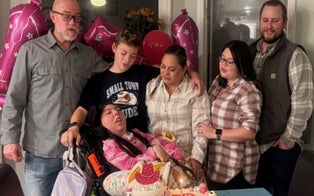Brown was in the third grade when her father sued her segregated Kansas school district.
Linda Brown, the woman who was once at the center of an historic legal battle that ended generations of school segregation, has died.
Brown was 76 and living back in Topeka when she died Sunday, a funeral home confirmed to CBS News.
When her journey into civil rights history began in 1950, Brown was just a third grade schoolgirl in the Kansas capital whose family believed she had the right to attend the nearby elementary school, which happened to be restricted to white children.
When she was denied enrollment into the school, Brown's pastor father sued.
Along with the NAACP and others challenging the half-century old "separate but equal" ruling, the case made it to the high court, where it was known — and continues to be remembered — as Brown v. Board of Education.
In 1954, with future Justice Thurgood Marshall arguing on Brown's side, the Supreme Court ruled that "separate but equal" violated the 14th Amendment guarantee of equal protection under the law.
As news of Brown's death broke this week, celebrities and political leaders took to social media to celebrate her life and mourn her passing.
"64 years ago a young girl from Topeka brought a case that ended segregation in public schools in America," tweeted Kansas Gov. Jeff Colyer. "Linda Brown's life reminds us that sometimes the most unlikely people can have an incredible impact and that by serving our community we can truly change the world."
"Linda’s father, Oliver, became lead plaintiff in Brown v. Board after trying to enroll her in an all-white school in 1951," filmmaker Ava DuVernay tweeted. "She was denied due to her race. NAACP challenged this. The Supreme Court ruled school segregation as unconstitutional in 1954. Hero."
Into adulthood, Brown continued to make public appearances and speak about the landmark case. She also helped take the school district back to court in the 1970s, arguing that the schools had never actually desegregated. The case was eventually decided in her favor by the ACLU.
Brown's side won that case in a Court of Appeals, leading to the construction of three new area schools, according to Biography.com.
In spite of her continued civil rights work, Brown and her family maintained that their role was as one plaintiff among many who helped get the case to the Supreme Court.
While she confirmed her passing, Brown's sister Cheryl said the family would not be commenting.
RELATED STORIES





